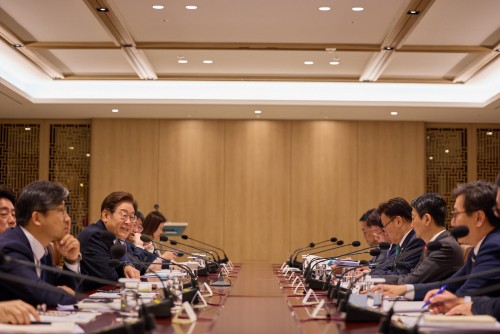 |
| President Lee Jae-myung chaired the second meeting of the Emergency Economic Task Force at the presidential office in Yongsan, Seoul, on June 9. / Source: Presidential Office |
President Lee Jae-myung has placed inflation control at the forefront of his administration’s economic agenda, calling it a critical issue directly affecting citizens’ livelihoods. Speaking at the second Emergency Economic Task Force meeting held at the Yongsan presidential office on June 9, he stressed the urgency of addressing rising prices.
“The inflation issue is causing significant pain for the people,” President Lee said. “Please check the current situation and come up with any possible countermeasures.”
Referring to recent price hikes in basic consumer goods, he asked, “Is it true that a single packet of ramen now costs 2,000 won?” His remarks came amid widespread price increases in daily necessities such as chocolate, coffee, bread, and frozen foods. Instant ramen, a staple for many, has reportedly reached nearly 2,000 won per serving.
First Vice Minister of Economy and Finance Kim Beom-seok explained, “Due to political uncertainty, prices of processed foods like ramen and beer—previously restrained—have risen sharply. We are also concerned about eggs and chicken. Especially boneless chicken, much of which is imported from Brazil, could see price spikes due to the outbreak of highly pathogenic avian influenza there.”
President Lee reiterated the need for a detailed report on inflation trends and feasible solutions before the next meeting. “There’s no such thing as an effect without a cause. Please identify the contributing factors and report back even before our next session if possible,” he said.
To reinforce the policy push, Lee plans to consult with the Democratic Party and accelerate the rollout of stabilization measures.
Democratic Party Floor Leader Park Chan-dae echoed the urgency during a Supreme Council meeting held at the National Assembly: “Price stability must be the foundation of public welfare. We will form a party-level task force to address inflation and work swiftly with the government to deliver tangible results.”
Lee also instructed his cabinet to expedite the formulation of a supplementary budget, aimed at boosting domestic demand and economic recovery. “Every hour we spend has the value of 52 million hours,” he emphasized, calling on officials to act with urgency and a strong sense of responsibility.
He directed priority support toward vulnerable groups and small businesses and asked ministries to collaborate closely to ensure the supplementary budget’s effectiveness. “Ministers can’t be expected to know everything,” he added, requesting that working-level officials—including vice ministers and department heads—also attend future meetings.
The second round of the supplementary budget (extra budget) currently being prepared is expected to total between 20 trillion and 30 trillion won, far exceeding the 13.8 trillion-won first-round budget finalized on May 1. It will likely include a 250,000-won local currency voucher for all citizens as part of efforts to stimulate consumption and aid economic recovery.
Most Read
-
1
-
2
-
3
-
4
-
5
-
6
-
7





















